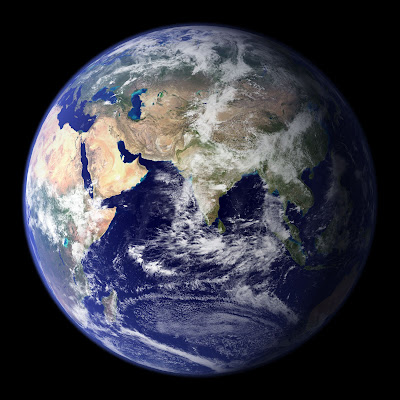A few weeks ago, on a beautiful day, I went for a jog through a nearby park and started thinking about what a nice planet we are so lucky to live on. Our nearest neighbors are a stormy, roiling furnace and a frigid, vacuous desert. The latest survey has found that there are a lot of planets out there, a lot of them may be habitable as well (capable of sustaining liquid water), but still, planets like Earth don't just show up everywhere.
Last year, astrophysicist Stephen Hawking made a mildly provocative statement that there is almost certainly intelligent life out there besides ourselves, but that it would be a mistake to try to contact them. Given what a rare oasis our planet is, maybe Hawking is correct in apparently believing that the plot of Independence Day is the most likely outcome. Hawking bases this on the idea that intelligent, space-faring species will probably act a lot like us. But then, it's not inconceivable that they might come to Earth just to take pictures, talk loudly about how inferior our customs are, and leave lousy tips. As annoying as this might be, interstellar tourism would be a boon to the global economy, which would certainly make people more concerned about conserving our planet's ecosystems.
So what sorts of things might be in a travel guide for Earth?
Located around a solo, spectral class G2V star approximately one quarter of the distance from the center of the Milky Way galaxy, this rocky, blue planet is known for it's vast oceans of liquid water and diverse and pervasive biological life forms.
Due to it's stable orbit and moderate atmosphere (composed primarily of Nitrogen and Oxygen), the climate of Earth is quite temperate, with temperatures ranging from approximately 70 to 120 times the universal background. In addition, it's healthy dynamo protect it from high levels of radiation from it's nearby star, making it an ideal destination for interstellar travelers looking for a place to relax and unwind.
Known as Earth, Tierra, Γη, 地球, Daigdig, الأرض, 지구, Земля, Trái Đất, and over 6000 other names by its local inhabitants, whatever you choose to call it, it has something for you. Bio-philes will want to explore Earth's rainforests, where over half of the planet's species of flora and fauna reside. Hydro-philes will be happy to hear that over water covers over 70% of the planet's surface and makes up over 99% of its habitable volume, meaning there is no shortage of life to explore beneath the surface as well. But travelers looking to get away from all the water needn't worry, approximately one fifth of the solid surface of the planet is covered by desert, some of which hasn't received any significant precipitation in over 400 seasonal cycles. While in the desert, travelers might want to take advantage of the relatively clear skies to check out the view of their home-world, or take a look Earth's only natural satellite. Due to lucky coincidence, the apparent size of Earth's moon from Earth's surface is very similar to that of its star, making it a rare place where, with proper timing, travelers can observe a total eclipse from the surface of a planet.
Of course, no trip to Earth would be complete without spending some time among it's own space-faring race. Homo sapiens is a relatively new species, but due to their ability to use fairly sophisticated technology, they have spread rapidly to all areas of the globe, and fundamentally transformed the landscape almost everywhere they've gone. About half of these "wise men" live in cities built with steel, stone, and dead plant matter, which rise above their surroundings and displace most of the other large organisms. A visit to these cities will reveal a busy population, who sell their labor in order to procure goods and services for themselves and their closest kin. The majority are primarily concerned with where there next meal will come from, while most of the rest are concerned with how they will be remembered once they die, which leaves little time to think about their relationship with their own home world. As a result, they have begun to fundamentally change the balance of their oceans, the extent of their rainforests, and the composition of their atmosphere without thinking about whether they have the right to do so. Like any planet sustaining life, Earth is an incredibly dynamic place, so for better or worse, it'll soon be a much different world. So make your travel plans today.
Ok, I can't see that last part in a travel brochure. Anyway, happy Earth Day.
Also, what would you put in your interstellar travel brochure?


Finally got a chance to sit down and read this.
ReplyDeleteFunny little travel brochure. You write so well, Tedley.
This part actually made me shiver:
"The majority are primarily concerned with where there next meal will come from, while most of the rest are concerned with how they will be remembered once they die."
Remember when we tried composting in Stadium?! That was short lived.
Great article, Thanks for your great information, the content is quiet interesting. I will be waiting for your next post.
ReplyDelete